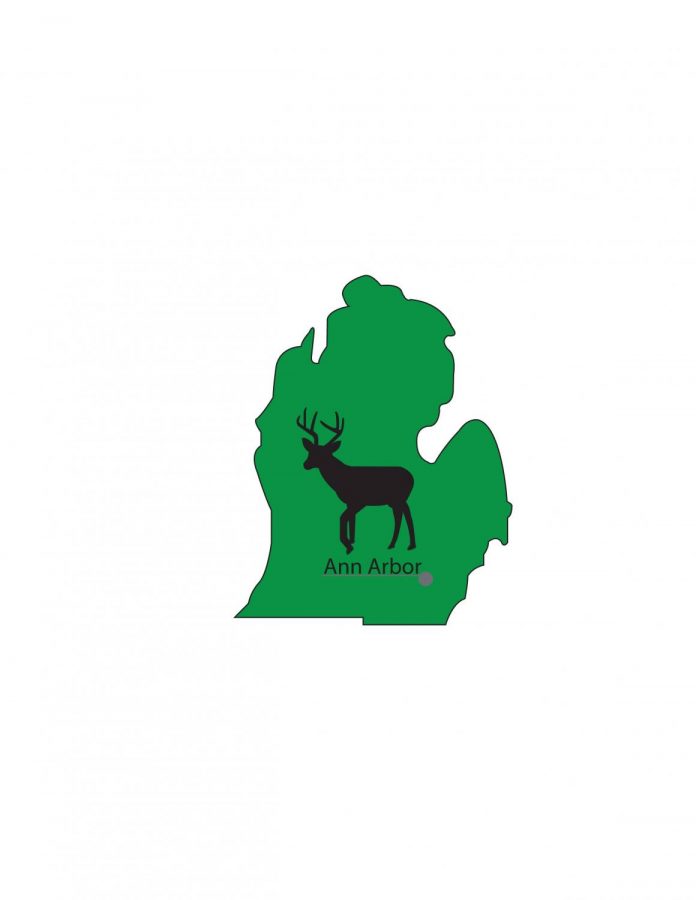Ann Arbor Dropping Dough on Does
Ann Arbor spends big money on deer culls and sterilization of does.
Illustration by Jonathan Callison
Ann Arbor plans to decrease the Whitetail Deer population in their area. The decision was made in a vote by the Ann Arbor City Council.
November 30, 2018
As the Michigan Whitetail hunting season rolls on through the end of Nov, a disturbance has arisen in the hunting community. The source of it? Ann Arbor’s city council.
According to an article by Mlive (Click Here), $182 thousand was approved on Nov. 8 by the Ann Arbor City Council, in an 8-2 vote, for their deer management plan. The deer management plan consists of sterilizing female Whitetail deer and having another deer cull. Sterilizing means removal of the ovaries so the deer cannot reproduce, and a deer cull is the killing of a predetermined amount of deer.
The city is spending a large amount of money for something that does not need to happen. According to Brent Rudolph, a DNR wildlife research specialist, as quoted in the Lansing State Journal back in 2015 (LSJ Article), there is an estimated 1.75 million deer in MI. Now, that is a lot of deer, but that is spread all over the state. Ann Arbor says the deer population in their town is too high and feel the need to stop the reproduction of deer in an expensive way.
I believe the deer population is not too high, especially with the spreading Chronic Waste Disease in mid-michigan. CWD is currently becoming more and more of a problem in MI. It is decreasing the population of deer by killing them. The money being wasted on sterilizing deer could be used to help fund the research of CWD and it may help find a cure. Also, there is a less expensive and profitable way to find a solution to the high population, so they would not have to spend a dime on sterilization. Instead, leave it to the hunters; provide tags for the hunters to buy, and they can go out and solve the problem. Ann Arbor would make money off of selling tags and the hunters get to put some more meat in the freezer for themselves or the food banks.
In addition to spending a lot of money, other disadvantages of sterilizing female deer are that they are still inhabiting the area. That does not decrease the threat of deer/car accidents, tick borne illnesses, and the destruction incurred by property owners. By allowing responsible hunters to harvest the deer, as opposed to sterilizing does and continuing deer culls, the hunters would be able to decrease the population, fixing some of the problems listed above.
However, there is some good that comes out of the decision by Ann Arbor. During the deer culls, the deer taken will provide food (venison) for the hungry. The Michigan Sportsmen Against Hunger (MSAH) non-profit organization is coordinating with deer management teams in cities like Ann Arbor that are performing deer culls. The MSAH pays licensed processors through donations to process the deer meat in which the MSAH will team with food banks, such as Food Gatherers in Ann Arbor, to feed the hungry.
“The MSAH has supported the decision of the city of Ann Arbor, as well as many other locations in Michigan with a higher than recommended deer population to sustaining habitat ratio, to perform culls,” Dean Hall, President of the MSAH organization said. “The MSAH helps in finding a wild game processor to process those culled deer into high protein venison burger, which is then distributed to shelters, pantries and food banks, to feed the hungry of local communities. The MSAH organization financially reimburses the processor for their work, per processed pound of venison burger produced.”
From the deer culls in Ann Arbor, Food Gatherers President and CEO, Eileen Spring, stated that in 2018 they received 3,015 pounds of venison. Using the pound to meal equivalent of 1.2, this equates to 2,512 meals.
There are both benefits and disadvantages of the decision Ann Arbor city council made. Maybe next time Ann Arbor, or a city having the same problem, can weigh the pros and the cons before coming to a decision. To help out the MSAH or find out more of what they do, check them out at: www.sportsmenagainsthunger.org

